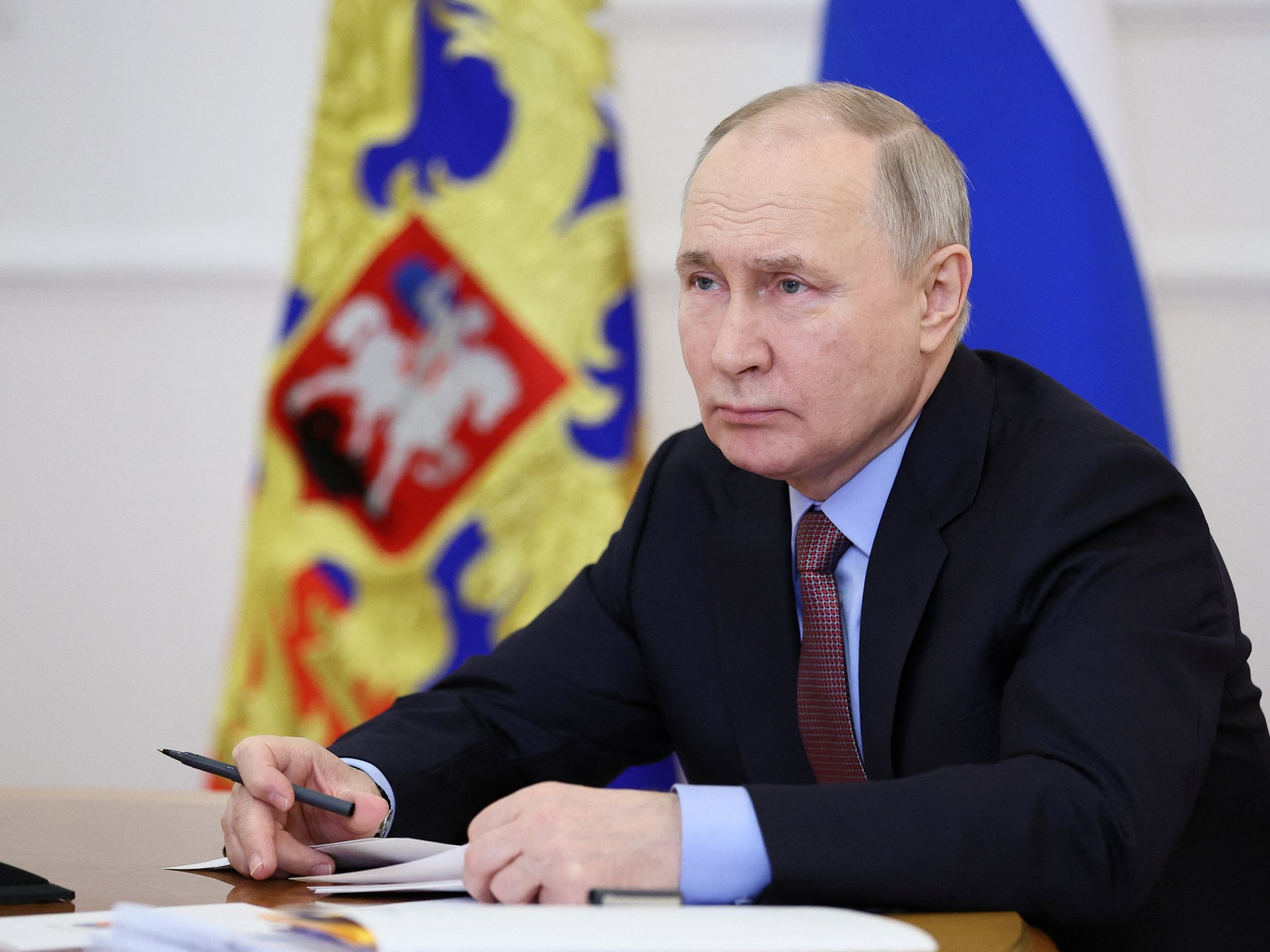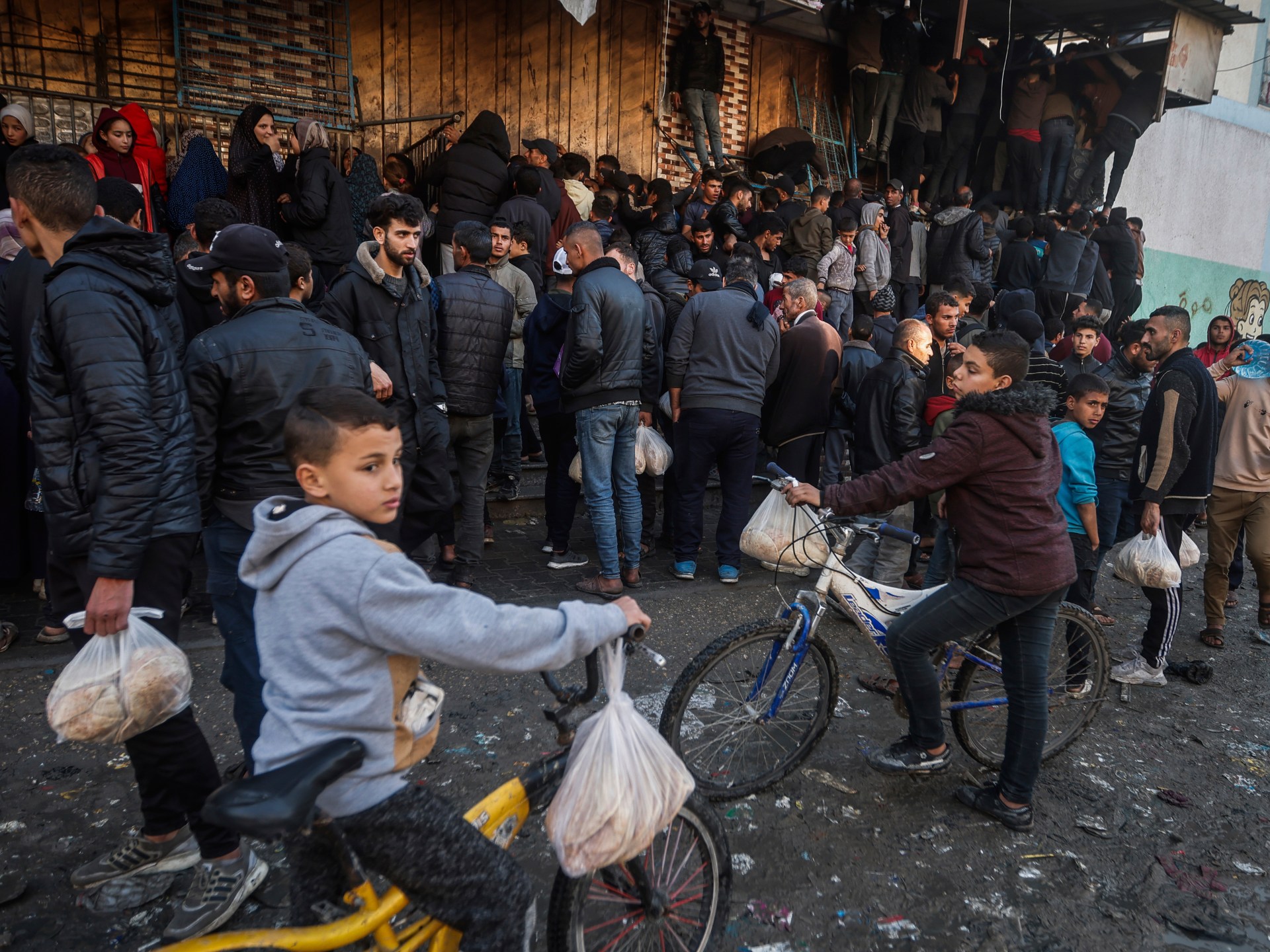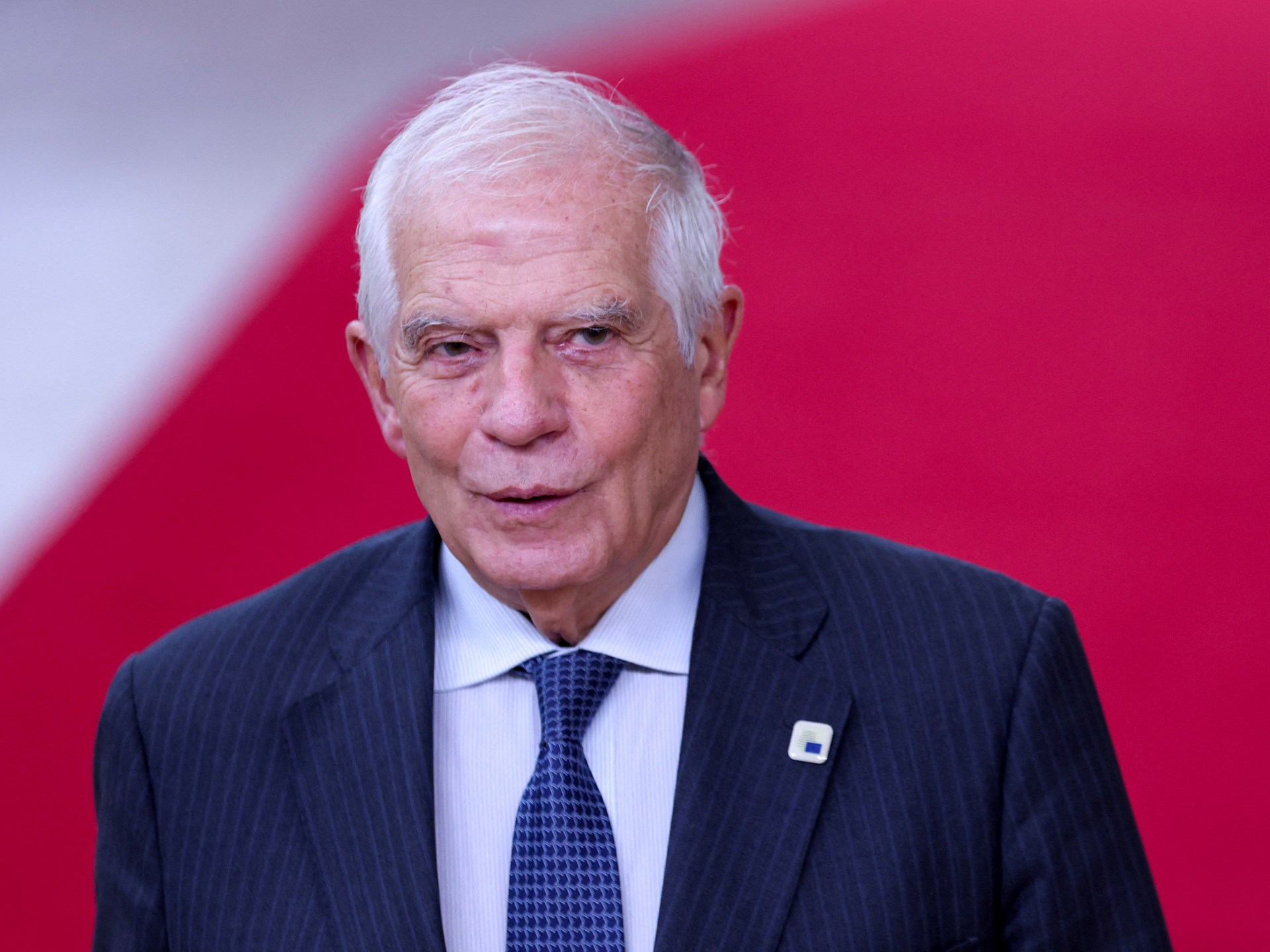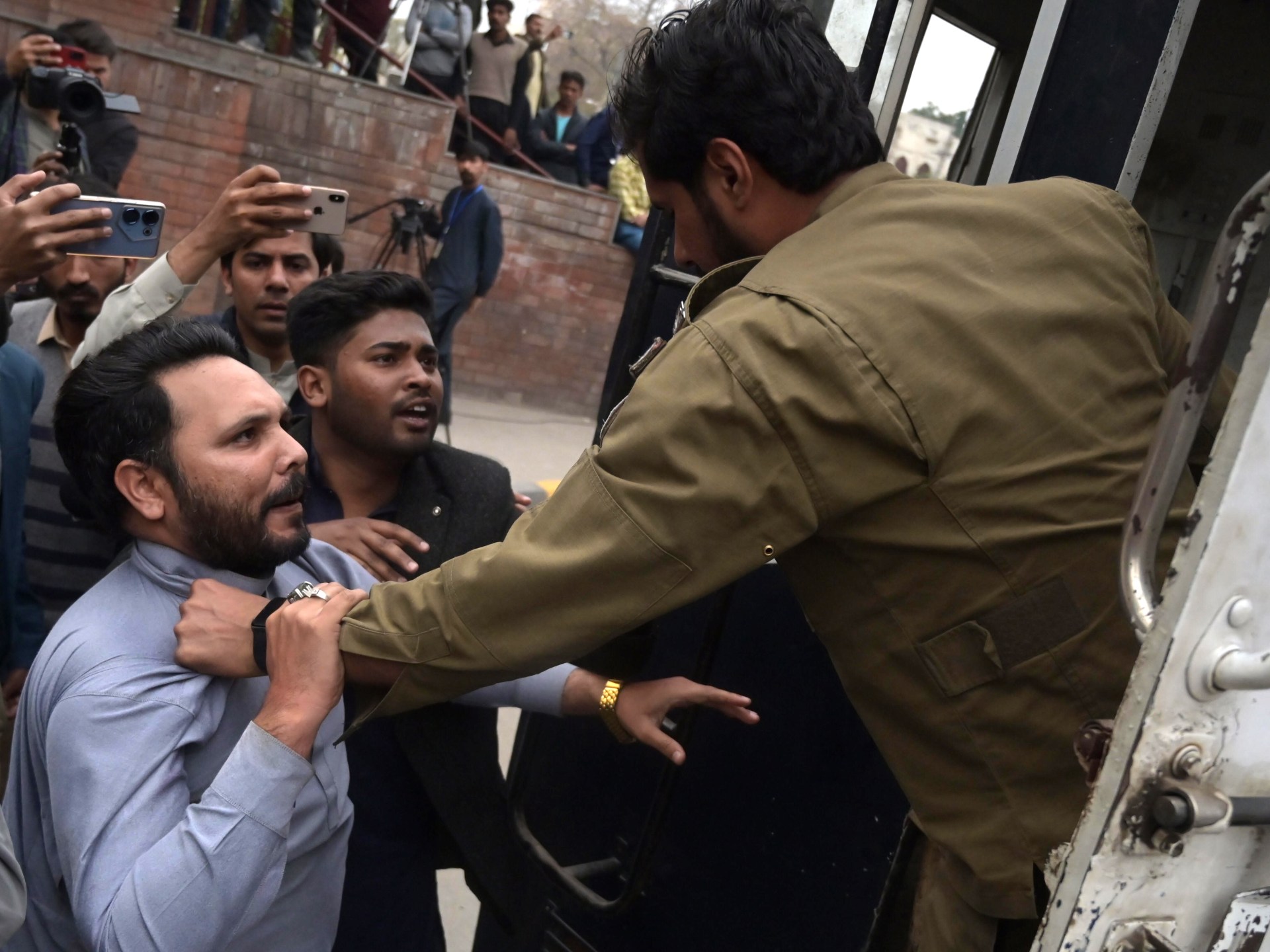Unease, uncertainty for displaced people in DR Congo ahead of Dec 20 vote | Elections
Nearly seven million people are currently displaced in the eastern Democratic Republic of the Congo, where renewed conflict with rebels from the March 23rd Movement (M23) is raging – a record high even in a country that has suffered decades of violence.
The grim announcement by the International Organization for Migration comes ahead of the DRC’s presidential election this month, as incumbent President Felix Tshisekedi squares off against some 20 opposition candidates.
Participating will be a challenge for people uprooted from their homes and living without access to basic services, or still sheltering in rebel-held territory. Meanwhile, questions of conflict and security have dominated campaign discourse.
In Goma, the provincial capital of North Kivu, tensions are high as December 20, the voting day, is fast approaching. Many of the displaced have directed their anger at a government they say has forgotten them and failed to bring permanent peace.
Innocent Tumaini is the camp-elected president of an informal site in Munigi on the outskirts of the city, where displaced people have massed under small tents made of scraps of plastic. He’s lived there for a little more than a year, since fleeing fighting in his home district of Rutshuru, where M23 currently controls swathes of territory.
The list of problems, Tumaini says, goes on and on. The latrines are unsanitary; illness spreads quickly; there is not enough to eat; the dead go without coffins since no one has money for a proper burial.
Desperate camp residents must travel along the busy road to Goma to beg, or venture into the nearby Virunga National Park to gather firewood to sell, he explained.
According to Tumaini, some 36 people were killed by an armed group on one such trip a few weeks ago. “Since then we are all afraid and no one wants to go to the park,” he said. “Now, we are starving.”
Al Jazeera could not independently verify this incident, but it is consistent with reports of ongoing violence in Congo’s besieged east, and within Virunga National Park itself.
The persistent conflict also means Tumaini has no plans to vote.
“We don’t want to hear about elections and any candidate who comes here will be stoned,” he told Al Jazeera. “The government is not doing anything to help us.”
Cycles of violence
A temporary lull in hostilities that began with an April ceasefire ended in October, as fierce fighting between M23, the national army, and a loose coalition of government-aligned militias called the Wazalendo, or “patriots” in Kiswahili, resumed.
Onesphore Sematumba, an analyst at the International Crisis Group, said the government, relying on the Wazalendo, sparked fighting in hopes of scoring a decisive victory over M23 ahead of voting day.
“Unfortunately, it didn’t work. There were some military gains for a few days, but the situation suddenly reversed itself. After 10 days, the war came even closer to Goma than before,” he said from Goma.
Primarily composed of DRC members of the Tutsi – an ethnic group also present in Burundi and Rwanda – M23 claims to fight for their rights and protection there, and because the government broke past peace agreements.
United Nations experts and the Congolese government have accused neighbouring Rwanda of backing M23, something Kigali and the rebels both deny.
A descendent of the National Congress for the Defense of the People (CNDP), the guerillas launched a previous rebellion in 2012, even capturing Goma before being beaten back by the Congolese army.
Their latest rebellion began in early 2022 and is estimated to have displaced one million people over the past two years. M23 leaders insist that they will continue to fight until their grievances are heard, while the government is reluctant to negotiate with the deeply unpopular rebel group.
Amidst this regional rivalry, fighting is creeping closer to Goma. In November, the Associated Press reported that clashes broke out as M23 tried to capture the town of Mweso, some 100km (60 miles) outside of Goma.
Desperate times
Of the many uprooted from their homes, at least 600,000 people were already sheltered in crowded and makeshift camps near Goma before the ceasefire broke, according to numbers released this summer by the United Nations Office for the Coordination of Humanitarian Affairs (OCHA).
Humanitarians are now struggling to respond to crisis after crisis, while the displaced continue to arrive.
“We have more and more displaced people coming towards Goma and not so much capability to be able to welcome them, support them and provide them with what they need,” Eric Batonon, country director for the Norwegian Refugee Council (NRC) said in a telephone call from Goma.
“Without intervention, we could quickly find ourselves in a much, much worse situation,” added Graham Inglis, the Goma project coordinator for Doctors Without Borders (Medecins Sans Frontieres, or MSF).
Angelique Wimana fled her native Rutshuru after fighting resumed in October, settling with her three children in one of the informal camps in Munigi. “There is no place to hide when it rains and we are living in a shed,” she said. “You cannot imagine how tough it is.”
The conditions in the camp can also be deadly. Wimana said her five-year-old son had died of cholera, a few days before she spoke with Al Jazeera.
Echoing Tumaini’s anger, Wimana says the election feels distant while her family is living in these conditions. She has no plans to vote, as registration never took place in her village because it was occupied by M23.
According to an October report by the International Crisis Group, nearly a million people were not registered as a result of insecurity. Only those with the money to travel from rebel-held territories to Goma or other registration sites were able to obtain the cards they needed to vote.
Some of the people who managed to get voting cards also lost them while running from rebels. In Munigi, Al Jazeera spoke to Florence Uwamahoro, who says she dropped her voting card during fighting between two Wazalendo groups.
The conversation was cut short when a demonstration over food distribution broke out in the camp. Residents began throwing stones when they realised there was not enough aid to go around.
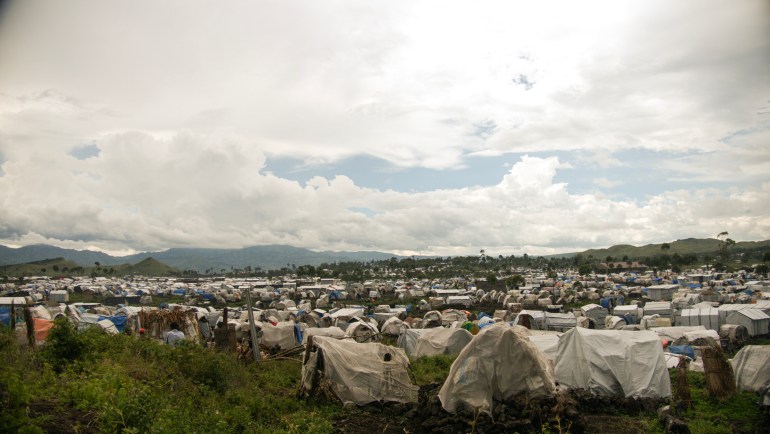
Campaigning for peace
Rumours that the elections might be postponed as a result of conflict have swirled in the DRC, something Tshisekedi flatly denied in an interview with France 24 in November.
Questions of conflict and security have meanwhile formed a central thread of campaign discourse. “As the country is experiencing serious security problems, security is at the centre of the entire electoral campaign,” Sematumba, of the International Crisis Group, said plainly.
Tshisekedi has long promised peace. Meanwhile, the opposition has attacked him over the brewing conflict within the country, with key challengers Moise Katumbi, Denis Mukwege, and Martin Fayulu all promising to restore calm to eastern Congo.
Mukwege, who was awarded the Nobel Peace Prize in 2018 for his efforts to heal survivors of wartime sexual violence, has in particular made peace as a path to prosperity a cornerstone of his campaign.
“This is the pillar of the work we are going to do to give back to the Congolese people their dignity and their value,” he told supporters in his hometown of Bukavu in November.
Other candidates have also focused on stability. “Peace has become one of the main terms of the campaign,” Sematumba explained.
M23 itself represents just a fraction of the problem. Eastern Congo is currently home to a web of 120 armed groups, all fighting for land and political control, or simply trying to survive. This too stands to impact the vote and the ability of local populations to take part.
Voting will be impossible in parts of Masisi and Rutshuru, for example, as both remain under M23 control. The situation mirrors the last election in 2018, when voting was delayed in districts suffering from an Ebola outbreak, sparking public outcry.
Tshisekedi has been accused of rigging elections in the past, entering a shadowy deal with former President Joseph Kabila five years ago, to ensure he’d be the one to take power.
“The government is watching [the opposition] and is very nervous,” said Paul Nantulya, a research associate at the Africa Center for Strategic Studies, a Washington, DC-based think-tank that receives funding from the United States Congress.
“Violence is going to become one of those things that they will cling on to, to try and depress or suppress the vote,” he added.
The probability of violence
With voting day just a few weeks away, there is also a high probability that political clashes could erupt, according to researchers.
“Electoral campaigns in Congo are often marked by violations,” said Sematumba of the International Crisis Group. As candidates make inflammatory speeches and political attacks, their young supporters are all the more likely to come to blows.
The election also coincides with the drawdown of the United Nations peacekeeping mission, best known by its French acronym, MONUSCO.
Residents of Goma and other cities in eastern Congo have protested the inability of peacekeepers to actually ensure their safety, despite the expensive mission having been active in the country for some two decades.
The demonstrations themselves often turn violent. In April 2022, at least five people were killed and 50 wounded in riots over MONUSCO’s presence in Goma. In October of this year, another 56 people were gunned down by the republican guard, ahead of a planned protest. The responsible officers were subsequently charged.
In September, Tshisekedi told the United Nations General Assembly that he intended to move the MONUSCO withdrawal date up a year, beginning it in December 2023.
“People have expectations that if their government is unable to protect them, at the least, the UN will do it, but over the years, the UN was unable to prevent attacks or to respond to them adequately, so [citizens] feel like [the UN] are useless,” Jean-Mobert Senga of Amnesty International told Al Jazeera at the time.
The accelerated end of the peacekeeping mission nonetheless removes another bulwark of protection for civilians in eastern Congo.
An East African peacekeeping force, comprised of seven nations, also began to withdraw from the country on Sunday. The government refused to renew its mandate, deeming the soldiers to be ineffective.
A better future
For some of the displaced, the impending vote provides a glimmer of hope. It represents good things to come, the chance that life will improve.
Al Jazeera met David Uwezo in the displacement camp where he lives with his family after fleeing fighting in October. Uwezo carefully carried his voting card with him as they ran. He’d gone to great lengths to register to vote in the first place, travelling into Goma to give his name to authorities and adding it to the voter list.
“It is good to have elections because things will change and the war will end,” he told Al Jazeera. He plans to vote to re-elect Tshisekedi, grateful that the incumbent has so far refused to negotiate with M23.
“There’s nothing ordinary Congolese citizens value more than democracy,” said Nantulya of the Africa Center for Strategic Studies. “Despite their conditions of displacement … despite the violence that is orchestrated against them and all the hurdles that have been put in their way, Congolese are going to turn up to vote.”
For Uwezo, voting brings him a little closer to being able to go back to his home and a normal life. “We need the government to resolve this situation,” he said. “We ask the whole world to help us return to our village.”
Check out our Latest News and Follow us at Facebook
Original Source


